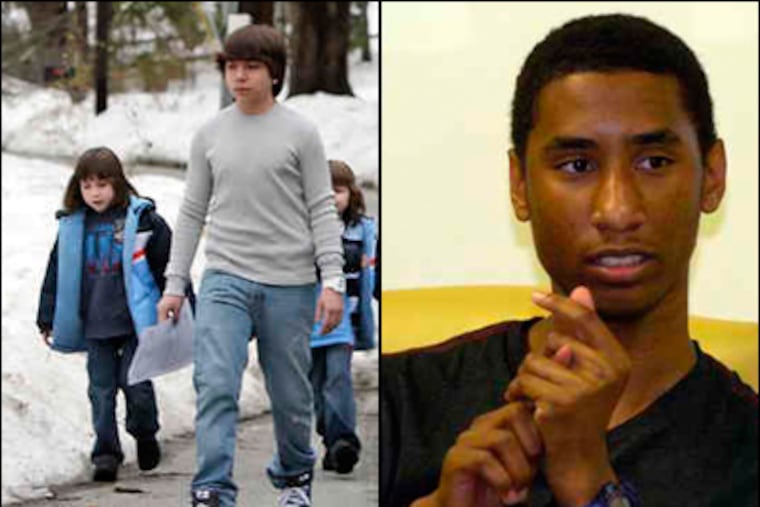Lower Merion district's laptop saga ends with $610,000 settlement
The Lower Merion School District will pay $610,000 to settle lawsuits over its tracking of student laptop computers, ending an eight-month saga that thrust the elite district into a global spotlight and stirred questions about technology and privacy in schools.

The Lower Merion School District will pay $610,000 to settle lawsuits over its tracking of student laptop computers, ending an eight-month saga that thrust the elite district into a global spotlight and stirred questions about technology and privacy in schools.
School board members voted unanimously Monday night to pay $185,000 to the two students who claimed the district spied on them by secretly activating the webcams on their laptops.
The bulk of the money, $175,000, will be put in trust for Blake Robbins, the Harriton High School junior whose family brought the issue to light in February. Jalil Hasan, who filed his lawsuit this summer after graduating from Lower Merion High School, will receive $10,000.
The district will also pay $425,000 in legal fees to their attorney, Mark S. Haltzman.
The announcement brought an abrupt end to a case that divided Lower Merion parents, fueled an acrimonious court battle, and was on pace to cost the district several million dollars. It also followed weeks of behind-the-scenes negotiations between Haltzman and district lawyer Henry E. Hockeimer, including two days of mediation ordered by the federal judges overseeing the cases and pressing for a resolution.
School Board President David Ebby said the board decided to settle after the district's insurance company agreed to cover $1.2 million of the costs. That insurer, Graphic Arts Mutual Insurance, initially refused to pay any claims because it said privacy-invasion claims were not covered under the district's multimillion-dollar liability policy.
Ebby also said the board thought a protracted trial could hurt the district, its families, and even Robbins and Hasan.
"Although we would have valued the opportunity to finally share an important, untold story in the courtroom, we recognize that in this case, a lengthy, costly trial would benefit no one," he said.
The settlement awaits the approval this week of U.S. District Judge Jan E. DuBois, who could make permanent his injunction barring the district from secretly tracking students.
Robbins' mother, Holly, said she was glad the case was over.
"I'm pleased with the outcome," she said from her Penn Valley home Monday night. "And I'm pleased that we were able to solve the problem and turn the cameras off, and that they put new policies into place."
Still unresolved is how much the district will pay out of pocket. A team of lawyers and computer specialists it hired has submitted more than $1 million in bills. And the attorney for at least one other student has notified the district that he was contemplating a lawsuit.
But school officials saw resolving the Robbins case as a key to closing one of the more unflattering chapters in Lower Merion history.
Beginning in 2008, the district rolled out a plan to give the nearly 2,300 students at its two high schools their own laptop computers to use in class and take home each day. Administrators never told students that missing computers could be remotely tracked using software that let technicians turn on webcams and see what was on a user's screen.
That capability burst into public view when Robbins and his parents filed their lawsuit in February. In it, they claimed that the district secretly snapped hundreds of images from the teen's laptop, including one when he was sleeping. Robbins learned of the technology, they said, when an assistant principal at his school confronted him with a webcam photo. Robbins had never reported his laptop missing, and school officials gave conflicting reasons for tracking his computer.
Lower Merion immediately disabled the technology, suspended two staffers who oversaw the tracking, apologized to students and parents, and hired a team of lawyers and computer specialists to investigate.
Their report found no proof that employees intentionally spied on students, but said the system suffered from poor planning and lax oversight. In less than two years, they said, the system stored more than 56,000 images, most from missing laptops. But the total included images of about 40 students whose webcams kept shooting - sometimes every 15 minutes - even after the students' computers had been found and returned to them.
Robbins' attorney won a temporary injunction in May and asked the judge to certify the case as a class action to cover every Lower Merion student.
The district resisted such a step, countering that it had quickly taken steps to end the practice. Its lawyers, along with a group of Lower Merion parents who asked to join the case, argued that Robbins was not representative of every student. And they challenged why, if Robbins' family were so concerned about privacy, it waited months to bring the case, and then shared photos of the teen with news media.
They also questioned Haltzman's request for nearly $500,000 in fees and expenses, arguing that he had inflated costs or was seeking payment for services that benefited his clients more than any aggrieved class.
But the judge rejected most of those arguments and pressed the sides to negotiate a settlement.
Michael Boni, one of the parents who joined the case to oppose the Robbins claims, called it "an extremely responsible" decision by the board.
"We think it sends a strong signal that there's no payday over suing the school over the laptop issue," said Boni, himself a class-action lawyer. "It's over now, and that's the best news of all."